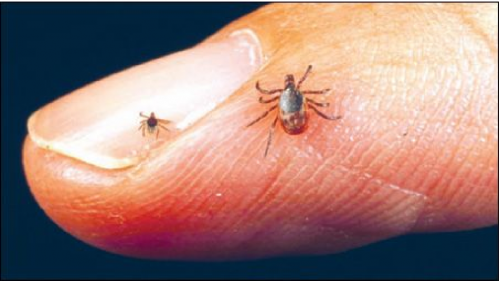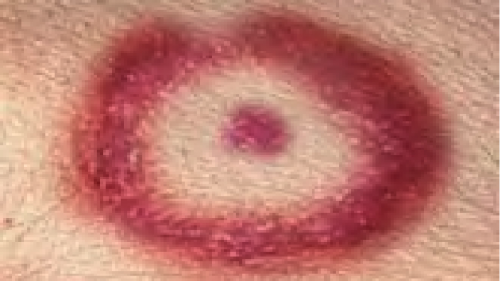Ticks and Lyme Disease
Information from Cape Cod Cooperative Extension.
Ticks are a common concern on Cape Cod. It’s important to be informed on the best ways to prevent tick bites and what to do if you’re bitten.
About Ticks
There are two main types of ticks on Cape Cod, the Deer tick and the Dog tick. Deer ticks transmit Lyme Disease during their nymph and adult stages. Ticks become infected during their nymph stage when they bite an infected mouse or bird. Nymphs will also bite humans. When they become adults they bite larger mammals such as deer and humans to feed and lay eggs. Nymphs pose a greater threat for transmitting lyme disease because their bites are harder to detect; they are most prevalent between May and July. Adults are most prevalent between Fall and Spring, however, you can be bit by a nymph or adult tick any time of the year.

Size of the nymph and adult Deer tick. Image from Cape Cod Cooperative Extension.
Lyme Disease
Lyme disease is a bacterial infection transmitted by a tick bite. Symptoms include a bulls-eye rash (though this only occurs in 60% of cases) and flu like symptoms such as fever, chill, and muscle pain. If untreated it can turn into a chronic case, making it important to get tested if you suspect you have Lyme disease.

Close up of the bullseye rash. Image from Cape Cod Cooperative Extension.
Prevention and Tick Removal
To prevent ticks from becoming embedded follow these guidelines:
- Tuck pants into your socks
- Wear light clothing so ticks are easily spotted
- Check yourself for ticks after you have been outside
- Use tick repellant containing DEET
- Spray your clothes with Permithrin
- Put clothes into a hot dryer for 20 minutes
- Remember to check your pets for ticks too! You can also get them tick repellant products.
If you do get a tick remove it with fine tipped tweezers and save and date the tick for later identification if you suspect you have Lyme Disease.
For more information visit the Cape Cod Cooperative Extension.

